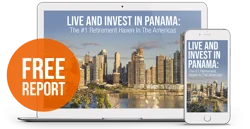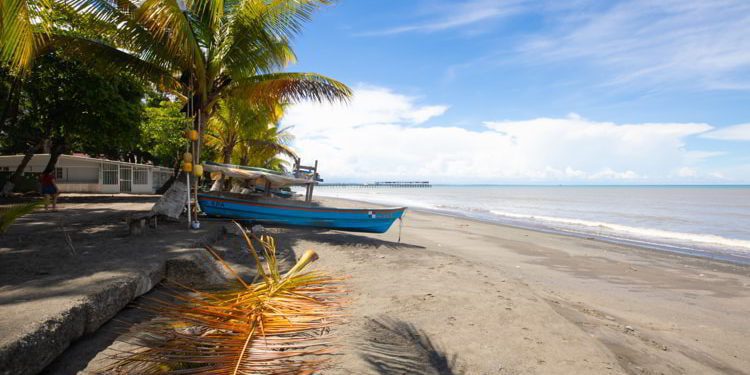The railroad rumbles through town as the shift-change siren wails overhead. There is a cargo ship stacked high with bananas sitting at the dock as workers scurry about on the pier below. A group of corporate executives sits nearby sipping from glasses of fresh coconut water while supervising their underlings. Laughter can be heard from a nearby saloon, and music pours out from the passing cars.
I imagine this must have been Puerto Armuelles, Panama, in its heyday. It was a time not long ago when Chiquita Banana Company called this small port town home, and the streets were packed, the restaurants busy, and trains were always rumbling through town.
Today, “Puerto,” as the locals refer to it, is simply a sleepy beachside town that is increasingly becoming home to more and more expats who are looking for alternatives to already discovered paradises.
Today, as I sit on the back porch of my two-story house (that I purchased for under US$20,000), I watch hummingbirds and other garden creatures flit around the papaya trees and hibiscus flowers as I listen to the local school band practice for the upcoming parade. I can’t help but think about the other places I have lived and visited and enjoy the fact that I have arrived in paradise.
After several years of living in Nicaragua and traveling throughout Central America, I had seen everything I needed to. The moment I arrived in Puerto, I knew I had found my ideal home. Small, on the beach, and full of friendly people, this is what I had been looking for.
Shades Of Blue And Green
The Pacific Ocean radiates the many shades of blue and green that only deep waters can create, while the sun peeks through the heavy clouds miles away.
The beach below the breakwater is beautiful yet desolate, with only a few small children playing in the waves and palms swaying in the breeze. Everything I wanted sat at the southernmost tip of western Panama.
Life in Puerto these days is slow and laid-back—nothing like the booming days of Chiquita. A traffic jam consists of three cars all trying to turn left, while a line at the grocery store means waiting for maximum four customers ahead of you.
People live with their doors and windows open and greet their neighbors as they pass by on the street, harkening back to simpler times. Sundays, the vendors stay home and it becomes a ghost town, with the exception of music drifting out from the open doors of several local bars.
The cost of living here is substantially lower than other expat destinations in Panama such as Boquete or Bocas del Toro where rent alone easily exceeds an entire month’s budget in Puerto.
The low cost of living—US$500 or less for rent, under $100 a month for utilities, water, and garbage-collection service—means that living on a fixed budget is easy, even if you indulge in occasional imported items or travel.
Get Your Free Panama Report Today!
Simply enter your email address below and we'll send you our FREE REPORT - Live And Invest In Panama: The #1 Retirement Haven In The Americas.
One of the reasons that Chiquita and the PTP Pipeline called Puerto home, besides the amazing depth of the water just off the coast, is its accessibility.
The town is only 40 minutes from the Costa Rica border crossing in Paso Canoas, while the major western city of Panama, David, is just over an hour’s drive. This makes shopping, health care, and travel in and out of Panama incredibly easy. Even for those without cars, Puerto is an easy commute with buses headed for David and the border leaving town every 20 minutes.
David is like all big cities in Central America: hot, dusty, and busy. I prefer to do most of my shopping here in Puerto and am always surprised when I can find almost everything I am looking for. Yes, I go to David for smoked salmon and bagels, but for everyday needs, Puerto offers a lot more than meets the eye.
I can get my watch battery changed and bought fresh lobster and crisp green broccoli all in the same day. Not bad for a town that has only one chain store and more vendors than streets.
I love living close to downtown but am just two blocks from the beach at the same time. I can walk anywhere in Puerto and still enjoy the luxury of having a
car when it rains. My house backs up to the now defunct airport, affording me space to grow my own vegetables and watch horses graze on shrubs.
Many expats have found great bargains in the Las Palmas neighborhood, originally designed for and inhabited by Chiquita executives and their families. The properties are expansive, but for one girl looking to live the dream, a small house at a bargain price was too much to pass up.
If spending your morning baking bread, your afternoon playing cards and enjoying a cool beverage with friends, and your evening eating a fresh, home-cooked dinner is your idea of paradise, then Puerto Armuelles may be the place for you. I know it certainly is for me…
Each time I go away I find myself asking, “How long until I get back to Puerto?”
Sincerely,
Rebecca Teeters
Contributor, Panama Letter
This article was first published in 2019 and has been recently updated.










